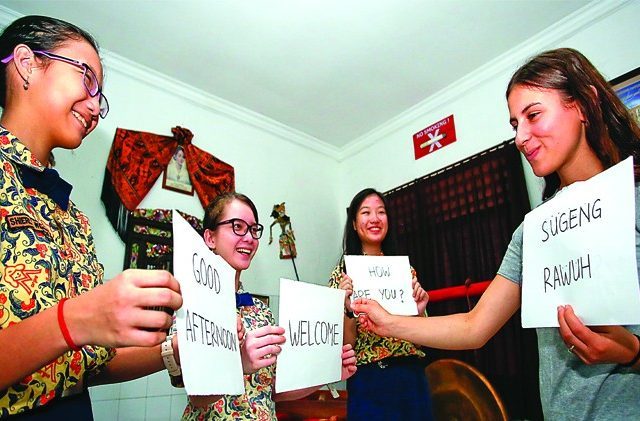The coming 2021 remains to be a great challenge following Indonesia’s fight against COVID-19 of flattening the curve of new infections. Yet it should not put a bridle on us to move ahead and do not lose sight of priority lists in 2021.
We should not forget our own new year resolution to define our future steps. We are facing a real-time challenge, no less perilous than military warfare, which is the cultural challenge. The military war results in fatalities for sure, yet the cultural challenge or war detaches the losers from their root and identity. While the former is harmful, the latter is subtle and gives no pain. Being unfamiliar with our own cultural identity and blinded by foreign values or anything from outside paves the way for the loss of traditional values. Extremity is synonymous with destruction.
Loss of traditional values is alarming than physical destruction. It is even everlasting. Demolished apartments or skyscrapers can be rebuilt, but we could not restore vanishing culture heedless of a continued and planned undertaking. For example, when I was a child in West Sumatra, ninik mamak (the men who have the authority to decide in accordance with customs law) were highly respected. For me, mamak is my mother’s brother – uncle. Every time my mamak paid our family a visit, I turned shy and was fearful of behaving badly for his charisma.
I do not think, alas, kids have their great respect to their mamak as I did a long time ago. Thought the government of West Sumatra has introduced local content into the curriculum of elementary school intending to instil local wisdom and traditional values in students, many mamak seems to have lost their dignity in the eyes of young people. This suggests that traditional values and actors are unable to harmonise themselves with recent and foreign influences.
Retaining traditional values should not be viewed as opposing modern, recent, and external ideas. No single community can survive through xenophobia – fear, hatred, or mistrust of that which is foreign, especially strangers or people from different countries or cultures – on earth.
Singapore and Dubai, no matter how small their size and population are, prove that openness to something new as well as transparency and eagerness to collaborate with any country are very central to their economic prosperity and social stability.
Preserving our values is compatible with elevating our culture to the point where it sits equally low and stands equally high to other cultures. There will be a new balance as the traditional and modern ideas work hand in hand. People will be proud by the time they contribute to maintaining the balance.
Speaking your own language is a part of elevating your culture. Having stayed in Australia for a couple of years, I found that preserving the Indonesian language is blessing and pleasure for my kids. Prior to going overseas, I thought that encouraging my kids to speak English is the best way to be accepted in Australia. Much to my surprise, today Australia is a multicultural society emphasising diverse culture rather than pushing sole assimilation. At school, teachers expect students to speak not just English but also their national language. I am thrilled to find that my children are good at code-switching, speaking different languages with different interlocutors.
As a country of immigration, Australians understands that it is everybody’s right to get to know their own root in an attempt to close the door for an identity crisis. Culture dies when we lose a language.
Speaking English as a global language of communication and Indonesian or local languages at the same time suggests that the globalised world is a world of diversity as opposed to a uniform world, which is only found in utopian movies and fiction. Speaking your own language is an investment in a cultural preservation effort.
Learning language, however, is not simply learning grammar and words that form sentences. It means learning custom of the place, story, song, or poetry. That is why speaking, and learning languages make you fathom how people view the world.
This is true. Some of my students researched the relationship between language and world view among Minangnese students at my university. They discovered that local wisdom and values in Minangnese proverbs, for instance, impact their belief in egalitarianism or their preference for self-reliance such as being an entrepreneur or businesspeople.
So, do not sell your local language short and underrate your dialect. Your worldview reflects well on what and how you speak.




